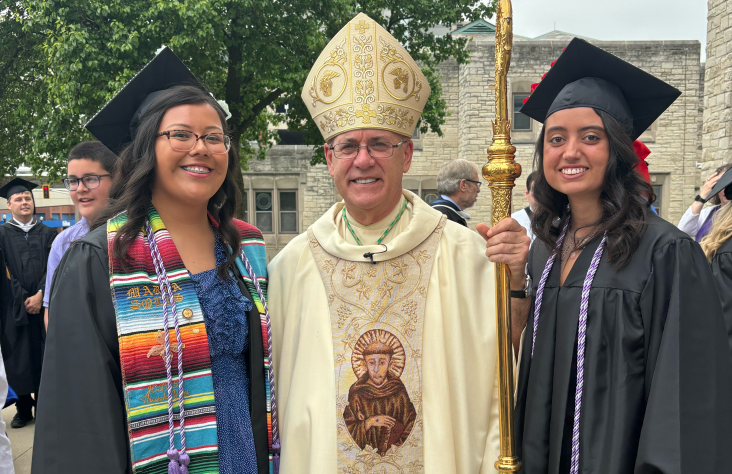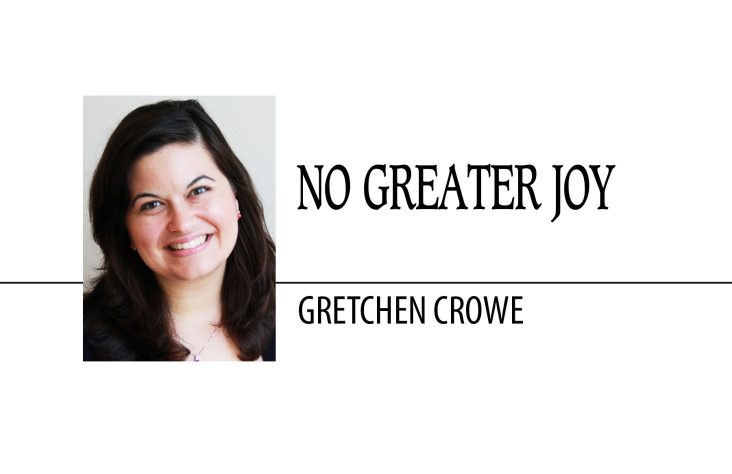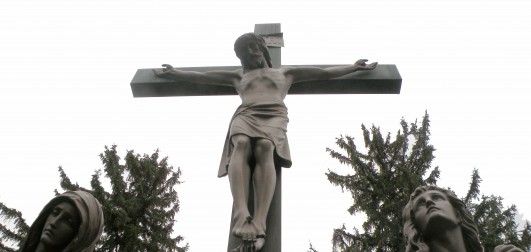October 29, 2009 // Uncategorized
The importance of the Catholic funeral Mass
By Karen Clifford
Death is a subject most people don’t usually wish to talk about. But communicating final wishes to loved ones is vital.
Father Michael Heintz, rector of St. Matthew Cathedral in South Bend, Father Mark Gurtner, pastor of St. Anthony De Padua, South Bend, and Pat McGann, director of McGann Hay Funeral Home and a St. Pius X, Granger, parishioner, offer their views on the importance of preparing for a Catholic funeral.
Fathers Gurtner and Heintz point out that just as a will is important in expressing a person’s desires after death, a written document specifying wishes for a funeral can be made by Catholics as well.
“I think people should definitely prepare a document with their funeral wishes,” says Father Gurtner. “You don’t know what the situation will be in the future and where your family members are going to be at in terms of the faith, so for family members to have something specifically spelled out for you is very important.”
When children leave the church, Father Gurtner points out, they often do not realize the importance of the funeral Mass. “What we see happening is people that are good faithful Catholics, who go to Mass every week, sometimes everyday, are denied a funeral Mass because the children don’t know their wishes.”
Father Heintz encourages parishioners to plan their funeral rites and is happy to assist them. “This includes not only music and readings for the Mass, but also the vigil service at the funeral home and the committal service at the place of burial,” he says.
Each priest in the Diocese of Fort Wayne-South Bend is required by the bishop to keep a personal document specifying what music, readings and liturgical ministries they wish family members, friends or clergy to participate in during their funeral Mass. These documents are stored at the chancery office.
Father Gurtner recommends having several copies of funeral arrangements in several places, such as filed with the will, in the church office and with family members.
When the death of a Catholic is near the priest should be notified. “If you know the death is coming soon, you should call the priest so they can hear their last confession, anoint the person and give Communion,” says Father Gurtner.
“There is often a misunderstanding by some that a person will die and then the priest is called to give the last rites or anointing of the sick. The anointing of the sick can only be given to the living,” he continues.
Both priests agree it is preferred that a funeral home should be contacted first following the death of a family member. “A funeral home director, serves as a kind of intermediary, and can assist the family with many of the decisions that need to be made about the particulars of which they are more competent to deal with,” says Father Heintz.
Pat McGann, director of McGann Hay
Funeral Home, talks about the role of the funeral home in the Catholic Mass.
“Over the years, the funeral director’s role has evolved and will continue to evolve as the Catholic Church adapts to societal changes. We guide and advise the family members regarding local customs in the arrangement conference at the funeral home or the family’s home.”
During a Catholic funeral Mass, several elements of protocol should be followed. “If the person planning the funeral wishes someone to speak words of remembrance, this can be arranged for the vigil service or at a gathering following the rites. It should be discouraged as part of the Mass itself,” says Father Heintz.
The music at a funeral Mass should be liturgically appropriate. Father Gurtner recognizes that while some popular Christian music is liturgically appropriate for a funeral Mass, some should be used only at the funeral home.
As for cremation, according to McGann, the bishop has asked funeral directors in this area to share with Catholic families that are thinking about cremation the order of the church’s preference in this area. They are:
• That the whole body be brought to church for the celebration of the Mass of Christian burial; and that a vigil, rosary, wake or prayer service be held the day before at the funeral home with cremation later, followed by burial in a consecrated cemetery.
• If the whole body is not brought to church, the ashes and urn should be brought to church for the celebration of the Mass and burial following.
• A memorial Mass can be held for the deceased without the body or the ashes and urn if the other two options are not possible or wanted.
Father Gurtner concludes, “The priest blesses the cremains and the church says that they must be sealed, usually in an urn. They must be treated just like a casket. You can’t keep it on your mantel. You can’t spread it around. And they should either be buried or sealed in a mausoleum. That is the reverent way to treat the cremains.”
Is there a way to legally document my preferences for my funeral services?
Indiana lawmakers have established a new way to remove some of the uncertainty, and perhaps some disagreements, regarding the funeral arrangement process with the passage of Indiana’s Funeral Planning Declaration statutes. Effective July 1, 2009, this law provides a vehicle for any competent person 18 years of age or older to designate a family member, friend or other, trusted individual as the person who is authorized to carry out funeral wishes specified in the declarant’s Funeral Planning Declaration. The full text of the new law, which includes a Funeral Planning Declaration form, can be viewed at www.in.gov/legislative/ ic/code/title29/ar2/ch19.html.
A Funeral Planning Declaration could be invaluable as a means of assuring a declarant that his/her desired funeral ceremony and burial preferences will be carried out after the declarant’s death. After all, a Catholic’s end of life worship preferences are no less important or meaningful than those undertaken during life.
The new law provides that a Funeral Planning Declaration must be separate from a will, power of attorney or similar document. It is a stand alone document and takes precedence over certain other documents concerning decision making on the disposition of the declarant’s body after death; the disposition of the declarant’s remains; the provision of funeral services for the declarant; religious ceremonies to be performed after the declarant’s death; the casket, urn or other merchandise necessary for the disposition of the declarant’s body after death; direction of funeral arrangements; and, grave memorials. The declarant designates the individual who is authorized to carry out the declarant’s preferences on such items, or who is entrusted to make those decisions on behalf of the declarant after the declarant’s death if no preference is provided. Either way, the new law presents a means to take guesswork out of who is authorized to direct the funeral planning process and gives a declarant some level of assurance that his/her religious preferences will be honored after death. If the declarant has a change of heart after making a valid Funeral Planning Declaration, the document can be destroyed, rendering it invalid, and another can be executed.
A declarant’s ability to have preferences that are designated in a Funeral Planning Declaration carried out as requested could be limited by such things as the declarant’s financial resources at the time of death or contractual agreements, such as a prepaid plan with a funeral home. You should consult a priest to determine the suitability of liturgy preferences. If you are interested in a Funeral Planning Declaration, coordinate it with your other estate plans and talk with priest to avoid roadblocks to having your preferences carried out after your death.
The best news. Delivered to your inbox.
Subscribe to our mailing list today.







